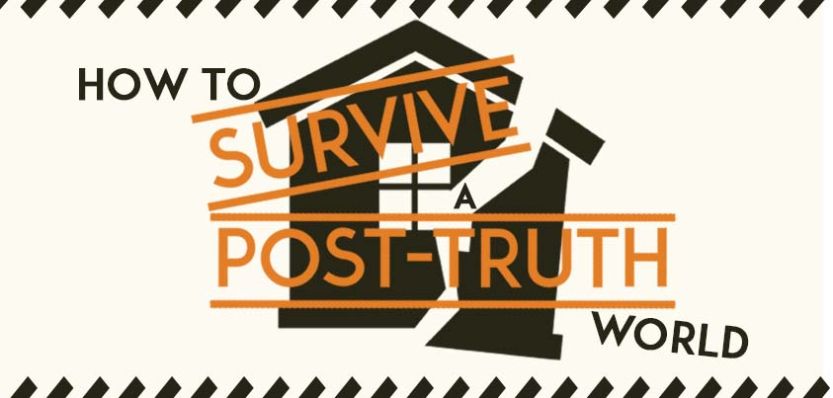In 2016 “post-truth” became an increasingly popular word. Why? How is it impacting you and me? And, most importantly, what should we be doing about it?
What’s the most important part of your house?
There are a lot of parts that matter, to be sure. The wiring matters. The plumbing matters. The walls matter. The framing matters. They all matter; they’re all important.
But most important? The most important part of your house is a part most people will never see:
The foundation.
There’s nothing pretty about the foundation of a house. It can’t be decorated or adorned as a wall can. It doesn’t affect the inner workings of the house as wiring and plumbing can. It doesn’t even have a huge impact on the final shape of the house as framing does. When a foundation is doing its job, most of us aren’t even aware it exists.
But not all foundations are created equal—and sometimes it’s not until a foundation stops doing its job that we realize just how important it really is.
Ancient foundations
Two thousand years ago, foundations were also important. At the end of His famous Sermon on the Mount, Jesus concluded with a parable about foundations. He told His audience:
“Therefore whoever hears these sayings of Mine, and does them, I will liken him to a wise man who built his house on the rock: and the rain descended, the floods came, and the winds blew and beat on that house; and it did not fall, for it was founded on the rock.
“But everyone who hears these sayings of Mine, and does not do them, will be like a foolish man who built his house on the sand: and the rain descended, the floods came, and the winds blew and beat on that house; and it fell. And great was its fall” (Matthew 7:24-27).
We don’t know much about the houses in this story. We don’t know if one house was bigger or better-looking than the other, because frankly, it doesn’t matter. When the floods and rains came, the only thing that mattered about the houses was where they were built.
The house on the sand may have been the most jaw-dropping, awe-inspiring house in the world, but none of that was enough to save it. When push came to shove, it was betrayed by the very ground it was built on.
Foundations matter.
Word of the Year
Last year, Oxford Dictionaries announced its 2016 Word of the Year:
Post-truth.
It’s a word that gained traction during last year’s heated Brexit debates and America’s controversial election season. Oxford Dictionaries defines it as “relating to or denoting circumstances in which objective facts are less influential in shaping public opinion than appeals to emotion and personal belief.”
But we’re not just talking about some hypothetical definition—more and more, it’s becoming reality. The Economist paints the disturbing picture of our post-truth world as one where truth is “of secondary importance” and “lies, rumour and gossip spread with alarming speed” (“Art of the Lie,” Sept. 10, 2016).
That’s not just unsettling—it’s terrifying. This is our world right now, today.
But what does any of it have to do with foundations?
Preference vs. truth
As Jesus illustrated in His parable, foundations matter—and not just for literal houses. Ideas and philosophies are built on foundations too, and the post-truth world is no different.
For some time now, the concept of “personal” or “subjective” truth has been floating around the world of philosophy—the idea being that what’s true for one person might not be true for another. The goal, then, is to discover your own personal truth and live according to it—whatever “it” might happen to be.
You can probably see some of the flaws in that line of thinking. It works fine when we’re talking about, say, our favorite candy bars. You might believe Almond Joys are the best, and I might tell you, no, Milky Ways are better. Is either of us wrong? No—because we’re not really talking about truth. We’re talking about preference. My preferring one candy bar over the other doesn’t make your preference invalid.
The problem comes when we try to extend that logic to things like morals and ethics. If Person A believes lying is never justifiable and Person B believes that sometimes lying is necessary, how do we decide which view is right?
If truth is personal, we can’t—it’s just the candy bars all over again. You like Almond Joys, I like Milky Ways. Person A believes in constant honesty, Person B believes in committing the occasional deception. It’s a matter of preference—calling one way right and the other wrong would require a set of universal standards, and personal truth doesn’t allow for those.
We’re looking, in other words, at a foundation problem.
Facts vs. feelings
Post-truth is built on the foundation of personal truth. In a world where all truth is subjective, where my truth is just as good as yours, the ultimate message is that truth doesn’t matter. Why should it? What you believe and what I believe can’t be classified as “wrong” or “right”—they can only be called “different.”
If everyone’s truth is equally valid, then what matters aren’t facts, but feelings.
If everyone’s truth is equally valid, then what matters aren’t facts, but feelings. What is true takes a backseat to what we want to be true—and that’s exactly the sort of environment where lies, rumors and misinformation can thrive. And it’s not just your Facebook newsfeed—even major news networks have a history of consistently bending the truth and spreading false stories.
So what’s the solution?
When the floods come
Personal, subjective truth—the foundation of the post-truth era—is a foundation of sand. It doesn’t matter what kind of house we build on it—when we begin with the assertion that truth can vary from person to person, that house is doomed. When the floods and the rains come, it will fall.
In fact, the floods have already started. How many acts of terrorism did we hear about last year? What about this year? Those acts were committed by people whose “personal truth” demanded the death of dozens, sometimes hundreds, of lives.
Were those terrorists justified in following their own truth? Are we willing to overlook the atrocities they committed while following their beliefs?
If we believe in personal truth, can we really even call them atrocities?
Choosing your foundation
When Jesus talked about foundations, He set forward a simple way to tell the difference between building on the rock and building on sand: “Therefore whoever hears these sayings of Mine, and does them, I will liken him to a wise man who built his house on the rock. … But everyone who hears these sayings of Mine, and does not do them, will be like a foolish man who built his house on the sand” (Matthew 7:24-27).
These “sayings” of Christ are recorded for us in Matthew 5-7, which is better known as the Sermon on the Mount. It’s an invaluable collection of insight and instruction for anyone seeking to live a life of meaning and purpose. But they aren’t personal truths. They aren’t just helpful sayings that only apply to some people.
We can’t build on a solid foundation until we can first accept that truth exists—and more importantly, that it exists outside of anyone’s personal opinion. When we make truth a matter of preference—whether as an individual, a nation or a planet—we set out to build a house on the sand.
Jesus Christ claimed to be the Son of God. He also claimed that “everyone who is of the truth hears My voice” (John 18:37).
Those are big claims—claims that no one should take at face value. We should inspect and examine them before deciding to believe them. But if those claims are true—if they hold up under scrutiny, if we find reason to accept them as truth—then we’ve also found a sure foundation to start building on.
Foundations matter. A world of personal truth (or worse, post-truth) is a world ready to collapse. The only way to survive in a post-truth world is to find the rock and start building.
What’s your house resting on?
If you’re interested in getting to know the God of all truth, then consider starting our free seven-day Journey “Knowing God.”






